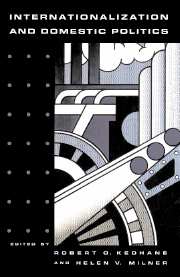Book contents
- Frontmatter
- Contents
- Preface
- Contributors
- PART I Theoretical Framework
- 1 Internationalization and Domestic Politics: An Introduction
- 2 The Impact of the International Economy on National Policies: An Analytical Overview
- 3 Internationalization, Institutions, and Political Change
- PART II The Industrialized Democracies
- PART III Internationalization and Socialism
- PART IV International Economic Crisis and Developing Countries
- PART V Conclusion
- Notes
- References
- Index
2 - The Impact of the International Economy on National Policies: An Analytical Overview
Published online by Cambridge University Press: 20 March 2010
- Frontmatter
- Contents
- Preface
- Contributors
- PART I Theoretical Framework
- 1 Internationalization and Domestic Politics: An Introduction
- 2 The Impact of the International Economy on National Policies: An Analytical Overview
- 3 Internationalization, Institutions, and Political Change
- PART II The Industrialized Democracies
- PART III Internationalization and Socialism
- PART IV International Economic Crisis and Developing Countries
- PART V Conclusion
- Notes
- References
- Index
Summary
By virtually any measure, cross-border trade and investment have grown at extraordinary rates over the past thirty years. Representative trade statistics for the industrial economies and the newly industrializing countries (NICs) are presented by Milner and Keohane in the Introduction to this volume. Among the poorest states, as well (the forty-three countries that the World Bank classifies as “low-income,” with per capita GNP of $610 or less in 1990), merchandise exports grew on average by 5.2 percent annually between 1965 and 1990 (computed from World Bank 1992: table 14). Cross-national flows of capital, as Milner and Keohane also indicate, increased even more sharply, roughly quintupling among the industrialized countries and doubling among the developing states in the single decade between the mid-1970s and the mid-1980s.
Increases of these magnitudes in international transactions – or more precisely, as we argue below, the exogenous easing of international exchange that such flows reflect – have affected domestic politics in virtually every country. Some of the ways in which they have done so are obvious, for example, controversies over trade agreements, common markets, non-tariff barriers, migration, and investment. Other impacts are less obvious but perhaps even more profound, including widespread repudiation of tax, regulatory, and macroeconomic policies that inhibit international competitiveness. This chapter attempts to elucidate how economic integration affects domestic politics, policies, and institutions by using international trade theories to generate testable propositions about the preferences of important groups within societies.
- Type
- Chapter
- Information
- Internationalization and Domestic Politics , pp. 25 - 47Publisher: Cambridge University PressPrint publication year: 1996
- 240
- Cited by

